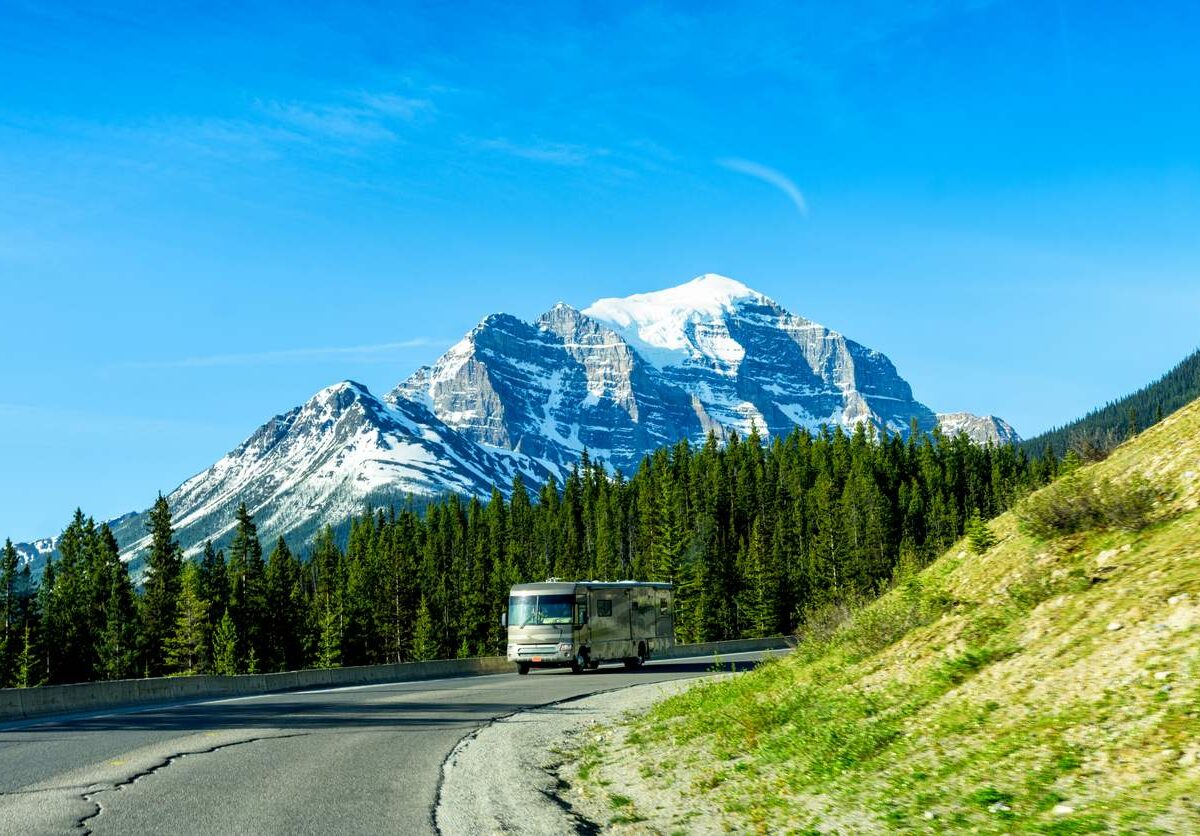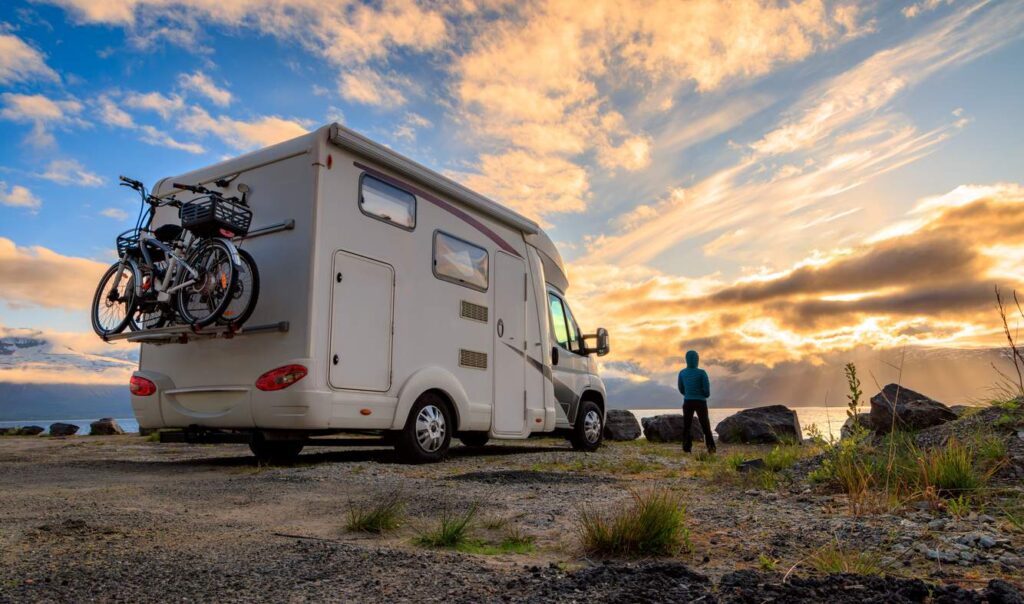Van Life Destinations: Where Will Living on the Road Take You?

From bustling towns to state parks and the great outdoors, it’s easy to pack up all you have and travel to new and exciting places in van life. The only real question that needs to be asked is which of the many RV destinations across the United States fits your bill and tastes the best.
With a little planning and research, you can map out the perfect trail to blaze in your van while taking advantage of all each area has to offer. Allow our team at Rjourney to show you some of the best van life destinations to stay at along your journey.
1. RV Parks in Colorado
Are you interested in spending most of your time in the great outdoors? Look no further than the great state of Colorado to start your RV life. Known for its stunning mountain views and diverse scenery, Colorado has become a popular destination for full-time van lifers, offering numerous outdoor activities and numerous cities to explore, including Denver and Colorado Springs.
Several campgrounds across Colorado cater to various tastes, including the Cortez RV resort by Rjourney.
Colorado Chain Law
In Colorado, non-commercial vehicles, like most vans, must follow the Passenger Vehicle Chain Law from September 1 to May 31. Two-wheel drive vehicles need either Mud and Snow (M+S) or All-Weather tires with at least a 3/16-inch tread depth, or chains/approved Alternative Traction Devices (ATDs). Four-wheel drive vehicles are not required to use chains, but they must carry them in case conditions worsen. This law applies when chain law signs are posted, and failure to comply can result in fines up to $500.
In Colorado, RVs and motorhomes weighing over 16,000 pounds are subject to the Commercial Vehicle Chain Law during winter months (September 1 to May 31). These vehicles must carry chains or approved Alternative Traction Devices (ATDs) when traveling on designated routes, regardless of whether they are two-wheel or four-wheel drive. This law applies when chain law signs are posted, and non-compliance can result in fines up to $500.
2. RV Parks in Minnesota
If you’re looking for a van life destination further north, consider Minnesota for your next stop. From extended stays in the great outdoors to camping closer to the Minneapolis-St. Paul metro area, the Land of 10,000 Lakes, provides a diverse range of opportunities for van living.
All you’ll need to do is prepare for the journey and choose the right Minnesota RV campground for your taste.
3. RV Camping in Wisconsin

For more opportunities in the north, travel next door to the state of Wisconsin for a whole new world of van life experiences. Van life in Wisconsin provides opportunities to explore the wilderness at a lower cost of living. It’s also easier to pack up and move closer to the city of Milwaukee.
Seasonal and full-time van lifers in the Badger State can enjoy a sense of freedom and adventure not found otherwise, all while staying at a state-of-the-art Wisconsin RV park.
4. RV Sites in New York
Although known for the Big Apple, the state of New York offers countless opportunities for van lifers, especially in upstate areas. For those tired of the hustle and bustle of the big city, RV life is a refreshing chance to explore nature, such as along Lake Ontario and Lake Erie. With several RV parks across New York, Rjourney has you covered for your next
5. Maine Camping Sites
Perhaps you want to immerse yourself in the wilderness away from large cities. There’s no better place to do so than the state of Maine. People who choose to stay in Maine during their van life journey are drawn by the state’s natural beauty, sense of community, and countless outdoor activities.
From coastal camping to deep in the thick of the forests, you can find a Maine RV campground with ease, particularly with Rjourney.
What All Do I Need and What Will My First Van Life Trip Cost?

Purchasing a Van or Renting
You should purchase or plan your rental van one to two months before departure. Expect it to cost anywhere from $10,000 to $85,000 to purchase or $50 to $200 a day for a rental. Consider the type of van (e.g., Sprinter, Transit, or ProMaster) and whether to buy or rent. Purchasing a used option will help to save on costs. High-end new vans can cost nearly $90,000 or more, depending on the model and potential upgrades.
Van Conversion or Build-out
A DIY van conversion can cost between $3,000 and $15,000 and take 3 to 6 weeks. A professional build might take 2 to 4 weeks to complete and cost $20,000 to $50,000. Areas of a van that many consider customizing are the bed, kitchen, solar panels, insulation, and storage.
Van Insurance, Driver’s Licence, and Other Legal Considerations
Get van insurance as soon as possible so your vehicle is legal to drive. If you want to wait until closer to your trip, we recommend insuring your van one to two weeks before departure. Insurance on your van can cost anywhere from $100 to $300 or more a month, depending on your age, driving history, insurer, and area you live. Coverage is for the van, and can also extend to the items inside.
Make sure your driver’s license is up to date and that you have all the necessary insurance documentation for your van. While this is a free to minimal cost item, it’s crucial to have everything in order to avoid any issues on the road.
Before heading out, check for any van life permits or overnight parking permits required in the areas you plan to visit. Some locations may have parking or camping restrictions, and the costs for permits can vary, often ranging from free to around $50 per day depending on the location.
Essential Gear and Equipment
- Essential camping gear. Some basic van life essentials, like a sleeping bag, tent, and cooking tools, can range from $500 to $2,000, depending on your comfort level and preferences. You could cut that cost considerably if you’re open to used camping equipment. You might also want to consider portable cooking equipment, a fridge, water storage, and solar lights for added convenience.
- Safety equipment. A first aid kit, fire extinguisher, and basic roadside assistance tools can cost from $100 to $300, depending on the quality and comprehensiveness of the items.
- Solar power setup. You’ll want to invest in solar panels to provide power while off-grid. Aim to set this up 1–2 weeks before departure, with costs ranging from $200 to $2,000, depending on the system’s size and quality.
- Portable toilet or toilet setup (if not in van). Consider a portable toilet or a setup like a composting toilet, with costs ranging from $50 to $200. This is a convenient option for off-grid living when access to restrooms is limited.
Tech and Internet Connectivity
A mobile hotspot can be a game-changer if you’re planning to work remotely while on the road, ensuring you stay connected even when you’re off the beaten path. While not absolutely essential, it offers the convenience of reliable internet access wherever you are. A navigation system or offline maps like Google Maps or Maps.me are invaluable for smooth travel, helping you stay on course, especially when you’re in areas with limited signal.
Lastly, a power bank or inverter is incredibly useful for keeping your devices charged during long stretches without access to power outlets, ensuring you’re always ready to navigate or stay connected when needed. Though not strictly necessary, these items can make life on the road much more convenient and comfortable.
Van Life Maintenance
In addition to preparing yourself, don’t forget about van maintenance. Check things like tires, fluids, and overall condition to make sure your van is in optimal shape for the journey. Maintenance costs can range from $100 to $500, depending on the work needed, and it’s important to perform this maintenance about a week before departure to avoid any unexpected problems during the trip.
How To Prepare Yourself for Living in a Van
As you plan, you’ll need to weigh the pros and cons of van life and see how long you desire to commit to this lifestyle. Remember to be honest with yourself as you ask questions about whether this life is right for you.
It’s also a good idea to schedule a routine health check-up about two weeks before departure. A basic physical examination will help ensure you’re in good health for the trip and can address any potential issues before you hit the road.
How To Map Out Your RV Life
Even with the best vans, RV life is only as fulfilling as how much you put into it. This effort includes mapping out your journey along the way. There are several online resources that help you map out each step of your journey. For a hassle-free journey, we recommend you plan as many stops as you can ahead of time to avoid last-minute scrambling.
As you narrow down your path, consider what you want to explore and which activities you want to do. You’ll also need to consider the weather and which time of year you’ll visit each of your destinations. Answering these questions will help determine which areas are best for you.
Enjoy Van Living With Rjourney
Whether you’re living in a van down by the river or near small town charm, your full-time RV life needs the best camping spots to make the most of your experience. At Rjourney, our many RV resorts and campgrounds across the country offer on-site amenities and activities so you never waste a moment in your unique lifestyle. To book your stay, find your nearest Rjourney resort or contact our team online today!